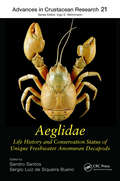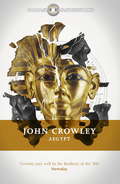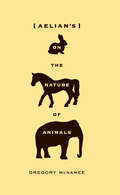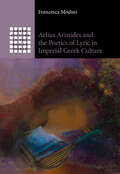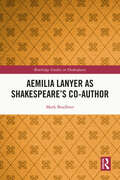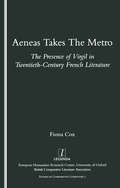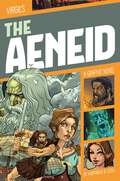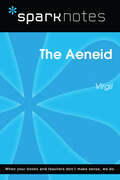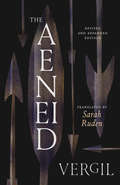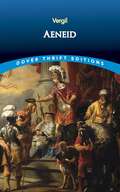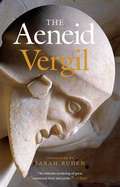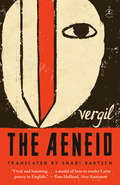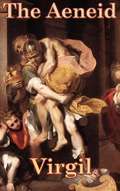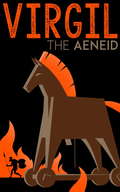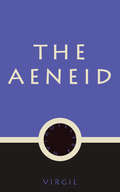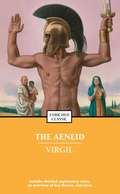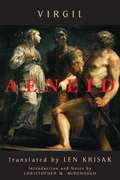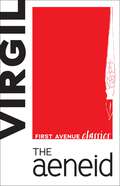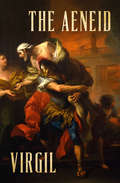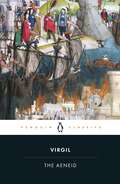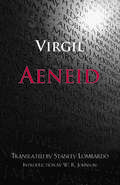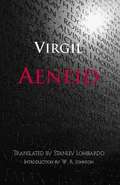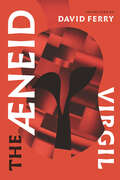- Table View
- List View
Aeglidae: Life History and Conservation Status of Unique Freshwater Anomuran Decapods (Advances in Crustacean Research #19)
by Sandro Santos Sergio Luiz de Siqueria BuenoAeglidae focuses on these unique crustaceans who are endemic to South America. The book is the first to summarize the diverse aspects of the Aeglidae, whose taxonomic features and phylogenetic relationships, evolutionary history and biogeographical background, biological characteristics, and current conservation awareness make them stand out among all other decapods. Addresses the morphology, taxonomy, and phylogenetics that characterize the Aegla and their relationship to other decapod taxa Provides in-depth treatment of the evolutionary history, biogeography, reproduction, developmental biology, and the life cycle of the Aeglidae Discusses their physiology, ecology and behavior, including physiological mechanisms associated with freshwater adaptation, population dynamics, trophic ecology, agonistic and non-agonistic behavior Covers the current conservation status of all known species of aeglids, major threats to them, the use of aeglids as flagships or umbrella species, and conservation action planning Edited by internationally distinguished leaders in this field. This will be an important reference not only for carcinologists working with this family of decapods, but also readers interested in the evolution, biogeography, taxonomy, phylogenetics, physiology, and reproductive ecology.
Aegypt: Book Three Of The Aegypt Cycle (FANTASY MASTERWORKS #3)
by John CrowleyThere is more than one history of the world. Before science defined the modern age, other powers, wondrous and magical, once governed the universe, their lore perfected within a lost capital of hieroglyphs, wizard-kings, and fabulous monuments. In the 1970s, a historian named Pierce Moffett moves to the New England countryside to write a book about Ægypt, driven by an idea he dare not believe: that the physical laws of the universe once changed and may change again. Yet the notion is not his alone. Something waits at the locked estate of Fellowes Kraft, author of romances about Will Shakespeare and Giordano Bruno and Dr. John Dee, something for which Pierce and those near him have long sought without knowing it: a key, perhaps, to Ægypt ...
Aelian's On the Nature of Animals
by Gregory McnameeNot much can be said with certainty about the life of Claudius Aelianus, known to us as Aelian. He was born sometime between A.D. 165 and 170 in the hill town of Praeneste, what is now Palestrina, about twenty-five miles from Rome, Italy. He grew up speaking that town's version of Latin, a dialect that other speakers of the language seem to have found curious, but-somewhat unusually for his generation, though not for Romans of earlier times-he preferred to communicate in Greek. Trained by a sophist named Pausanias of Caesarea, Aelian was known in his time for a work called Indictment of the Effeminate, an attack on the recently deceased emperor Marcus Aurelius Antoninus, who was nasty even by the standards of Imperial Rome. He was also fond of making almanac-like collections, only fragments of which survive, devoted to odd topics such as manifestations of the divine and the workings of the supernatural.His De Natura Animalium (On the Nature of Animals) has a similar patchwork quality, but it was esteemed enough in his time to survive more or less whole, and it is about all that we know of Aelian's work today. A mostly randomly ordered collection of stories that he found interesting enough to relate about animals-whether or not he believed them-Aelian's book constitutes an early encyclopedia of animal behavior, affording unparalleled insight into what ancient Romans knew about and thought about animals-and, of particular interest to modern scholars, about animal minds.If the science is sometimes sketchy, the facts often fanciful, and the history sometimes suspect, it is clear enough that Aelian had a fine time assembling the material, which can be said, in the most general terms, to support the notion of a kind of intelligence in nature and that extends human qualities, for good and bad, to animals. His stories, which extend across the known world of Aelian's time, tend to be brief and to the point, and many return to a trenchant question: If animals can respect their elders and live honorably within their own tribes, why must humans be so appallingly awful?Aelian is as brisk, as entertaining, and as scholarly a writer as Pliny, the much better known Roman natural historian. That he is not better known is simply an accident: he has not been widely translated into English, or indeed any European language. This selection from his work will introduce readers to a lively mind and a witty writer who has much to tell us.
Aelian's On the Nature of Animals
by Gregory McnameeNot much can be said with certainty about the life of Claudius Aelianus, known to us as Aelian. He was born sometime between A.D. 165 and 170 in the hill town of Praeneste, what is now Palestrina, about twenty-five miles from Rome, Italy. He grew up speaking that town's version of Latin, a dialect that other speakers of the language seem to have found curious, but-somewhat unusually for his generation, though not for Romans of earlier times-he preferred to communicate in Greek. Trained by a sophist named Pausanias of Caesarea, Aelian was known in his time for a work called Indictment of the Effeminate, an attack on the recently deceased emperor Marcus Aurelius Antoninus, who was nasty even by the standards of Imperial Rome. He was also fond of making almanac-like collections, only fragments of which survive, devoted to odd topics such as manifestations of the divine and the workings of the supernatural.His De Natura Animalium (On the Nature of Animals) has a similar patchwork quality, but it was esteemed enough in his time to survive more or less whole, and it is about all that we know of Aelian's work today. A mostly randomly ordered collection of stories that he found interesting enough to relate about animals-whether or not he believed them-Aelian's book constitutes an early encyclopedia of animal behavior, affording unparalleled insight into what ancient Romans knew about and thought about animals-and, of particular interest to modern scholars, about animal minds.If the science is sometimes sketchy, the facts often fanciful, and the history sometimes suspect, it is clear enough that Aelian had a fine time assembling the material, which can be said, in the most general terms, to support the notion of a kind of intelligence in nature and that extends human qualities, for good and bad, to animals. His stories, which extend across the known world of Aelian's time, tend to be brief and to the point, and many return to a trenchant question: If animals can respect their elders and live honorably within their own tribes, why must humans be so appallingly awful?Aelian is as brisk, as entertaining, and as scholarly a writer as Pliny, the much better known Roman natural historian. That he is not better known is simply an accident: he has not been widely translated into English, or indeed any European language. This selection from his work will introduce readers to a lively mind and a witty writer who has much to tell us.
Aelius Aristides and the Poetics of Lyric in Imperial Greek Culture (Greek Culture in the Roman World)
by Francesca ModiniThis book is the first study of the persistence and significance of ancient lyric in imperial Greek culture. Redefining lyric reception as a phenomenon ranging from textual engagement with ancient poems to the appropriation of song traditions, Francesca Modini reconsiders the view of imperial culture (paideia) as dominated by Homer and fifth-century Attic literature. She argues that textual knowledge of lyric allowed imperial writers to show a more sophisticated level of paideia, and her analysis further reveals how lyric traditions mobilised distinctive discourses of self-fashioning, local identity, community-making and power crucial for Greeks under Rome. This is most evident in the works of Aelius Aristides, who reconfigured ancient lyric to shape his rhetorical persona and enhance his speeches to imperial communities. Exploring Aristides' lyric poetics also changes how we interpret his reconstruction of the classical tradition and his involvement in the complex politics of the Empire.
Aemilia Lanyer as Shakespeare’s Co-Author (Routledge Studies in Shakespeare)
by Mark BradbeerThis book presents original material which indicates that Aemilia Lanyer – female writer, feminist, and Shakespeare contemporary – is Shakespeare’s hidden and arguably most significant co-author. Once dismissed as the mere paramour of Shakespeare’s patron, Lord Hunsdon, she is demonstrated to be a most articulate forerunner of #MeToo fury. Building on previous research into the authorship of Shakespeare’s works, Bradbeer offers evidence in the form of three case studies which signal Aemilia’s collaboration with Shakespeare. The first case study matches the works of "George Wilkins" – who is currently credited as the co-author of the feminist Shakespeare play Pericles (1608) – with Aemilia Lanyer’s writing style, education, feminism and knowledge of Lord Hunsdon’s secret sexual life. The second case-study recognizes Titus Andronicus (1594), a play containing the characters Aemilius and Bassianus, to be a revision of the suppressed play Titus and Vespasian (1592), as authored by the unmarried pregnant Aemilia Bassano, as she then was. Lastly, it is argued that Shakespeare’s clowns, Bottom, Launce, Malvolio, Dromio, Dogberry, Jaques, and Moth, arise in her deeply personal war with the misogynist Thomas Nashe. Each case study reveals new aspects of Lanyer’s feminist activism and involvement in Shakespeare’s work, and allows for a deeper analysis and appreciation of the plays. This research will prove provocative to students and scholars of Shakespeare studies, English literature, literary history, and gender studies.
AEMT: Advanced Emergency Care and Transportation of the Sick and Injured Advantage Package
by AAOSThe all-new Fourth Edition of Advanced Emergency Care and Transportation of the Sick and Injured combines comprehensive content with an unparalleled suite of digital resources to fully empower AEMT students and educators.
Aeneas Takes the Metro: The Presence of Virgil in Twentieth-century French Literature
by Fiona Cox"This study traces Virgil's journey through twentieth-century France by examining his profile in the works of Gide, Aragon, Valery, Pagnol, Klossowski, Butor, Simon and Pinget, and by looking at how their Virgilian appropriations complement and modify current readings of the ""Aeneid"" and other works. His presence in these works provides insights not only into modern French culture but into the Virgilian oeuvre itself. This process of mutual illumination is highlighted in Cox's argument by theories of intertextuality and dialogism. Although Virgil's presence in French literature is characterized by its focus on exile and uncertainty, Cox's study reaffirms the multivalency of this great European poet and his continuing relevance at the turn of the millennium."
The Aeneid: A Graphic Novel (Classic Fiction Ser.)
by Diego AgrimbauVirgil’s classic tale of a hero’s mythical journey comes to life in this graphic retelling for kids. From the smoldering ruins of Troy, the warrior Aeneas sets out to find a new homeland for his people. But it’s no easy task, for his adventure is filled with great sacrifice, angry gods, tragic love, and brutal battles. Will Aeneas be able to fulfill his destiny and found the mighty city of Rome? With extra background on the original Latin epic poem and its author, plus discussion questions and writing prompts, it’s easy to introduce young readers to this literary classic.
The Aeneid (SparkNotes Literature Guide Series)
by SparkNotesThe Aeneid (SparkNotes Literature Guide) by Virgil Making the reading experience fun! Each SparkNote gives you just what you need to succeed in school with:*Summaries of every chapter and thorough Analysis *Explanation of the key Themes, Motifs, and Symbols *Detailed Character Analysis *Key Facts about the Work *Author's Historical Context *Identification and explanation of Important Quotations *A 25-question review Quiz, Study Questions and Essay Topics to help you prepare for papers and testsGet your A in Gear with SparkNotes
The Aeneid: Translated By Shadi Bartsch (The\focus Classical Library)
by VergilA powerful and poignant translation of Vergil&’s epic poem, newly equipped with introduction and notes This is a substantial revision of Sarah Ruden&’s celebrated 2008 translation of Vergil&’s Aeneid, which was acclaimed by Garry Wills as &“the first translation since Dryden&’s that can be read as a great English poem in itself.&” Ruden&’s line-for-line translation in iambic pentameter is an astonishing feat, unique among modern translations. Her revisions to the translation render the poetry more spare and muscular than her previous version and capture even more closely the essence of Vergil&’s poem, which pits national destiny against the fates of individuals, and which resonates deeply in our own time. This distinguished translation, now equipped with introduction, notes, and glossary by leading Vergil scholar Susanna Braund, allows modern readers to experience for themselves the timeless power of Vergil&’s masterpiece. Praise for the First Edition: &“Fast, clean, and clear, sometimes terribly clever, and often strikingly beautiful. . . . Many human achievements deserve our praise, and this excellent translation is certainly one of them.&”—Richard Garner, The New Criterion &“Toning down the magniloquence, Sarah Ruden gives us an Aeneid more intimate in tone and soberer in measure than we are used to—a gift for which many will be grateful.&”—J. M. Coetzee &“An intimate rendering of great emotional force and purity. . . . The immediacy, beauty, and timelessness of the original Latin masterpiece lift off these pages with gem-like originality.&”—Choice
Aeneid: Aeneid, Book Viii: A Vocabulary And Test Papers; By Tutors Of University Correspondence College (classic Reprint) (Dover Thrift Editions: Poetry)
by VergilConsidered the greatest Roman poet, Vergil spent over a decade working on this monumental epic poem, which has been a source of literary inspiration and poetic grandeur for more than 2,000 years. Its twelve books tell the heroic story of Aeneas, a Trojan who escaped the burning ruins of Troy to found a new city in the west. This city, Lavinium, was the parent city of Rome.Drawn by divine destiny after the fall of Troy, Aeneas sailed westward toward the land of the Tiber. After many adventures, he and his men were shipwrecked on the shores of Carthage, where Aeneas and Queen Dido fell in love. Reminded of his duty, however, Aeneas sailed on. After visiting his father in the underworld, Aeneas saw the future of the Roman people and their exploits in peace and war. Eventually he arrived in Italy, where he and his men struggled valiantly to secure a foothold for the founding of Rome.Vast in scope, crowded with exciting adventure and heroic deeds, the Aeneid was Vergil's imagined account of Roman beginnings and a tribute to the history, character and achievements of the Roman people. On the other hand, its depth, vision and empathy with human suffering make the poem relevant to the general human condition. Now this enduring multileveled masterpiece is available in this republication of a standard unabridged translation, the most inexpensive complete version available.
The Aeneid
by Vergil Sarah RudenThis extraordinary new translation of Vergil's Aeneid stands alone among modern translations for its accuracy and poetic appeal. Sarah Ruden, a lyric poet in her own right, renders the classic poem in the same number of lines as the original work--a very rare feat that maintains technical fidelity to the original without diminishing its emotional power. Ruden's translation follows Vergil's content faithfully, and the economy and fast pace she achieves are true to his own unflagging narrative force. With its central theme of national destiny versus. the destiny of individuals, the poem has great resonance in our own times, and Ruden adheres closely to the poet's message. Her rendering of Vergil's words gives immediacy to his struggling faith that history has beauty and purpose in spite of its pain. With this distinguished translation, modern readers can experience for themselves the timeless power of Vergil's masterpiece.
The Aeneid: Translated By Shadi Bartsch (Barnes And Noble Classics Ser.)
by Vergil VirgilA fresh and faithful translation of Vergil&’s Aeneid restores the epic&’s spare language and fast pace and sheds new light on one of the cornerstone narratives of Western culture.&“The best version of the Aeneid in modern English: concise, readable and beautiful, but also as accurate and faithful to Vergil&’s Latin as possible.&”—James J. O&’Hara, George L. Paddison Professor of Latin, University of North Carolina at Chapel HillFor two thousand years, the epic tale of Aeneas&’s dramatic flight from Troy, his doomed love affair with Dido, his descent into the underworld, and the bloody story behind the establishment of Rome has electrified audiences around the world. In Vergil&’s telling, Aeneas&’s heroic journey not only gave Romans and Italians a thrilling origin story, it established many of the fundamental themes of Western life and literature—the role of duty and self-sacrifice, the place of love and passion in human life, the relationship between art and violence, the tension between immigrant and indigenous people, and the way new foundations are so often built upon the wreckage of those who came before. Throughout the course of Western history, the Aeneid has affirmed our best and worst intentions and forced us to confront our deepest contradictions.Shadi Bartsch, Guggenheim Laureate, award-winning translator, and chaired professor at the University of Chicago, confronts the contradictions inherent in the text itself, illuminating the epic&’s subversive approach to storytelling. Even as Vergil writes the foundation myth for Rome, he seems to comment on this tendency to mythologize our heroes and societies, and to gesture to the stories that get lost in the mythmaking. Bartsch&’s groundbreaking translation, brilliantly maintaining the brisk pace of Vergil&’s Latin even as it offers readers a metrical line-by-line translation, provides a literary and historical context to make the Aeneid resonant for a new generation of readers.
The Aeneid
by VirgilFollow Aeneid as he flees a burning Troy with his family and sets out on a dangerous journey to found what will one day become The Roman Empire. Thrill with him as he gets caught up in conflicts between the gods, all the while striving to complete his own grand destiny. Virgil intended this book to be a sequel to the Iliad and the Odyssey, and as such it takes up with events just after the finish of the Odyssey. Inscribed here are myths and legends and tales of bravery destined to last for all time.
The Aeneid
by VirgilThe national epic of Ancient Rome, presented here in the John Dryden translation. The Aeneid picks up at the end of The Iliad. Aeneas, a survivor of Troy, flees with a group of Trojans. It has been foretold that he will lead them to a new home, to what will become Rome. Aeneas finds himself caught up in the scheming and machinations of the Gods, and is torn between his duty and his heart. If he is to fulfill his destiny, he must stay focused and determined - but at what cost? Penguin Random House Canada is proud to bring you high quality, classic works of literature in e-book form. Find more today and rediscover books you never knew you loved.
The Aeneid: Selected And Arranged With Brief Notes (classic Reprint)
by VirgilThe Aeneid is a Latin epic poem, written by Virgil from 29 to 19 BCE, that tells the legendary story of Aeneas, a Trojan who travelled to Italy, where he became the ancestor of the Romans. It is composed of roughly 10,000 lines in dactylic hexameter. The first six of the poem's twelve books tell the story of Aeneas's wanderings from Troy to Italy, and the poem's second half tells of the Trojans' ultimately victorious war upon the Latins, under whose name Aeneas and his Trojan followers are destined to be subsumed.
The Aeneid: Selected And Arranged With Brief Notes (classic Reprint) (Enriched Classics)
by VirgilENDURING LITERATURE ILLUMINATED BY PRACTICAL SCHOLARSHIP Virgil's sweeping epic of Trojan warrior Aeneas and the founding of Rome -- a stirring tale of exile, heroism, and combat, and of a man caught between love, duty, and fate. THIS ENRICHED CLASSIC THIS ENRICHED CLASSIC EDITION INCLUDES: A concise introduction that gives the reader important background information A chronology of the author's life and work A timeline of significant events that provides the book's historical context An outline of key themes and plot points to guide the reader's own interpretations Detailed explanatory notes Critical analysis and modern perspectives on the work Discussion questions to promote lively classroom and book group interaction A list of recommended related books and films to broaden the reader's experience Enriched Classics offer readers affordable editions of great works of literature enhanced by helpful notes and insightful commentary. The scholarship provided in Enriched Classics enables readers to appreciate, understand, and enjoy the world's finest books to their full potential.
The Aeneid (Focus Classical Library)
by VirgilRising to the challenge of rendering the poem's Latin hexameters by adopting English iambic ones, Len Krisak's Aeneid doubles down on the English poetic tradition by also featuring rhyme. In Krisak's hands, these devices provide not only a superb kind of music but the snap and power of an epic adventure that glories in what only formal poetry can do. Enhanced by an Introduction and an extensive set of notes by Christopher M. McDonough, this Aeneid works as story, voice, and verse.
The Aeneid: Selected And Arranged With Brief Notes (classic Reprint) (First Avenue Classics ™)
by VirgilAeneas—the son of a human and Venus, the goddess of love—escapes the siege of Troy with a boat full of other Trojans, and sails for Italy where he is destined to found the city of Rome. A storm diverts them to Carthage, where Aeneas meets Dido, the city’s ruler and queen. He recounts the tale of his dangerous journey across the Mediterranean to her, and the two fall in love. After the gods remind Aeneas that it is his fate to start a new city, he sails for Italy, leaving a devastated Dido behind. The Italians are at first friendly, but when war breaks out, Aeneas must fight to fulfill his destiny. Virgil originally wrote his epic poem, The Aeneid, in Latin around 20 BCE. This is an unabridged version of the English translation by John Dryden, first published in 1697.
The Aeneid: Selected And Arranged With Brief Notes
by VirgilThe Latin epic poem The Aeneid, which was written between 29 and 19 BC by Virgil, narrates the narrative of Aeneas, a Trojan who fled the collapse of Troy and made his way to Italy, where he eventually settled and became the progenitor of the Romans. It has 9,896 dactylic hexameter lines. The poem's second half describes the Trojans' eventually successful fight against the Latins, under whose name Aeneas and his Trojan followers are destined to be absorbed. The wanderings of Aeneas from Troy to Italy are detailed in the first six of the poem's twelve books. Greco-Roman myth and legend were already familiar with the hero Aeneas because he appeared in the Iliad. The Aeneid was transformed by Virgil from the disjointed tales of Aeneas' wanderings, his hazy connection to the founding of Rome, and his description as a personage of no fixed characteristics other than scrupulous pietas into a compelling founding myth or national epic that connected Rome to the Troyan legends, explained the Punic Wars, exalted traditional Roman virtues, and validated the Julio-Claudian dynasty. One of the best pieces of Latin literature and largely recognized as Virgil's masterpiece is The Aeneid.
The Aeneid
by Virgil'The most truthful translation ever, conveying as many nuances and whispers as are possible from the original' The TimesAfter a century of civil strife in Rome and Italy, Virgil wrote the Aeneid to honour the emperor Augustus by praising his legendary ancestor Aeneas. As a patriotic epic imitating Homer, the Aeneid also set out to provide Rome with a literature equal to that of Greece. It tells of Aeneas, survivor of the sack of Troy, and of his seven-year journey: to Carthage, where he falls tragically in love with Queen Dido; then to the underworld,; and finally to Italy, where he founds Rome. It is a story of defeat and exile, of love and war, hailed by Tennyson as 'the stateliest measure ever moulded by the lips of man'.Translated with an Introduction by DAVID WEST
Aeneid: Books Ix. , X (classic Reprint) (Hackett Classics)
by VirgilLong a master of the crafts of Homeric translation and of rhapsodic performance, Stanley Lombardo now turns to the quintessential epic of Roman antiquity, a work with deep roots in the Homeric tradition. With characteristic virtuosity, he delivers a rendering of the Aeneid as compelling as his groundbreaking translations of the Iliad and the Odyssey, yet one that--like the Aeneid itself--conveys a unique epic sensibility and a haunting artistry all its own.W. R. Johnson's Introduction makes an ideal companion to the translation, offering brilliant insight into the legend of Aeneas; the contrasting roles of the gods, fate, and fortune in Homeric versus Virgilian epic; the character of Aeneas as both wanderer and warrior; Aeneas' relationship to both his enemy Turnus and his lover Dido; the theme of doomed youths in the epic; and Virgil's relationship to the brutal history of Rome that he memorializes in his poem.A map, a Glossary of Names, a Translator's Preface, and Suggestions for Further Reading are also included.
The Aeneid
by VirgilThe Aeneid recounts the story of Rome's legendary origins from the ashes of Troy and proclaims her destiny of world dominion. This optimistic vision is accompanied by an undertow of sadness at the price that must be paid in human suffering to secure Rome's future greatness. The tension between the public voice of celebration and the tragic private voice is given full expression both in the doomed love of Dido and Aeneas, and in the fateful clash between the Trojan leader and the Italian hero. Translated by Stanley Lombardo.
The Aeneid
by David Ferry VirgilIn 2012, David Ferry capped a long career as a poet with a National Book Award, given in honor of his book Bewilderment: New Poems and Translations. But he had no interest in resting on his laurels. In fact, he was in the middle of the most ambitious poetic project of his life. Six years earlier, at age eighty-two, he had embarked on a complete translation of one of the foundational works of Western culture: Virgil’s Aeneid. Now we have it, and it is a glorious thing. Ferry has long been known as perhaps the foremost contemporary translator of Latin poetry, his translations of Virgil’s Eclogues and Georgics having established themselves as much-admired standards. He brings to the Aeneid the same genius, rendering Virgil’s formal, metrical lines into an English that is familiar and alive. Yet in doing so, he surrenders none of the feel of the ancient world that resonates throughout the poem and gives it the power that has drawn readers to it for centuries. In Ferry’s hands, the Aeneid becomes once more a lively, dramatic poem of daring and adventure, of love and loss, devotion and death. Never before have Virgil’s twin gifts of poetic language and fleet storytelling been presented so powerfully for English-language readers. Ferry’s Aeneid will be a landmark, a gift to longtime lovers of Virgil and the perfect entry point for new readers. “I sing of arms and the man . . . ” The epic journey, from the fall of Troy to the founding of Rome, is ready to begin. Join us.
